“If You Want to Live Here, You Need to Live by the Rules Here”
A sexual assault case involving refugee children in Idaho. A microcosm of America in the age of Trump.

iStock
Last month, rumors began to ricochet around the city of Twin Falls, Idaho, that three Syrian refugees had raped a 5-year-old girl. Some in town said that the attackers, all juveniles themselves, held the girl at knifepoint. It was said that they urinated on her naked body and that one of the boys’ fathers high-fived his son when he learned what he had done.
At a City Council meeting on June 13, several residents of Twin Falls, population 44,125, questioned officials about the alleged crime; a man named Terrence Edwards linked it to the terrorist massacres in Orlando, Florida, and San Bernardino, California. He accused the police of perpetrating a cover-up. “ISIS is here,” he said. “The Muslim Brotherhood is here. There’s been violations already occurred by Muslims here.” The members of the City Council didn’t know what to make of all this. At that point, the only coverage of the alleged rape had been a brief mention on local TV news of a police investigation into a “reported sexual assault around the Fawnbrook apartments,” and the lurid rumors hadn’t yet reached them.
The council’s failure to provide answers inflamed things. “This was a pretty violent attack,” Davis Odell told me later. Odell is a 29-year-old who started the Facebook group Justice for Our Children to demand a political response to the alleged assault. “Where were the details? Why weren’t they given?” As she saw it, Twin Falls was protecting the reputation of refugees, even at the expense of the public’s safety. “The city has an agenda,” she said.
Soon the story of the alleged rape spread beyond Twin Falls. One resident provided an anonymous report to a right-wing website called BehindMyBack.org. The anti-Muslim blog Creeping Sharia picked up the report, and by June 20, it had migrated to Infowars.com, a conspiracy site favored by Donald Trump. The Drudge Report trumpeted the Infowars story with the headline “Syrian Refugees Rape Little Girl at Knifepoint in Idaho.”
The story circulating online was wrong in all its particulars. On June 20, Twin Falls county prosecutor Grant Loebs told the local newspaper, “There were no Syrians involved, there was no knife involved, there was no gang rape.” He blamed anti-refugee groups for circulating misinformation. “There is a small group of people in Twin Falls County whose life goal is to eliminate refugees, and thus far they have not been constrained by the truth,” Loebs said.
Yet as wild as the rumors were, they’d grown from a kernel of truth. There had been an incident involving three boys, ages 7, 10, and 14, and a mentally disabled 5-year-old girl; Loebs described it to me as a “very serious felony.” On June 2, an 89-year-old neighbor discovered the children in the laundry room at the Fawnbrook Apartments, a low-income housing complex. The youngest boy is from Iraq while the older ones, brothers, are from an Eritrean family that passed through Sudanese refugee camps. (Most news reports have identified the older boys as Sudanese.) Only the youngest boy, Loebs said, is alleged to have touched the girl, though investigators suspect the 10-year-old might have as well; the elder boys reportedly made a video.
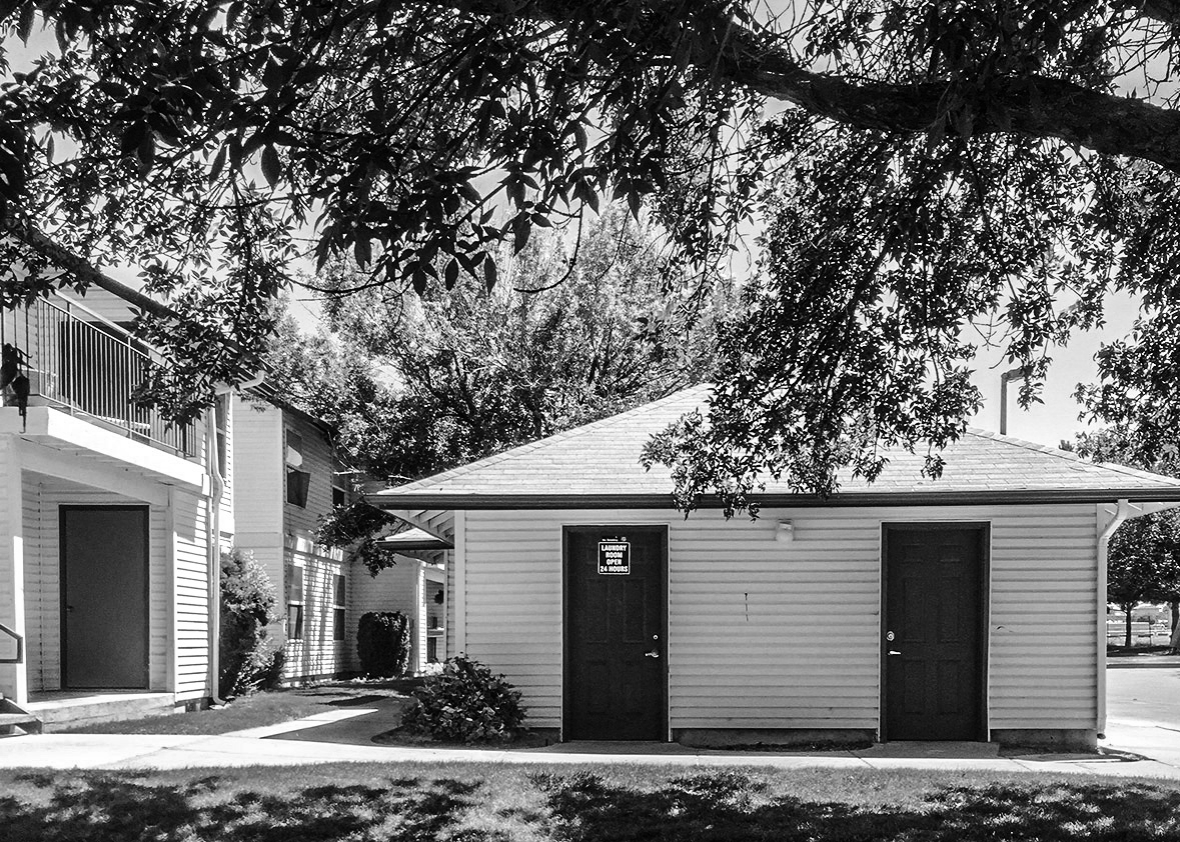
Michelle Goldberg/Slate
Because everyone involved in the case is a minor, the records were sealed. Nevertheless, on the evening of June 20, Twin Falls Police Chief Craig Kingsbury appeared at the weekly City Council meeting to update the anxious public as best he could. He announced that police had arrested the two older boys the previous Friday and that they were being held in juvenile detention. (Loebs later told me that the 7-year-old was also charged with a felony but wasn’t taken into custody because of his age.) Kingsbury laid out how the investigation had been conducted, elaborating the police department’s procedures for questioning children in sexual abuse cases and explaining why it took weeks to charge the boys.
At news of the arrests, the citizens who’d packed the meeting burst into applause. But many of them weren’t mollified. Newspapers all over Idaho, as well as media outlets nationwide, had reported on the debunking of the Syrian gang-rape story, but some in Twin Falls saw the focus on the mistaken details—the ethnicity of the perpetrators, the presence of a knife—as a way to sweep a true story of Islamic violence under the rug. Julie Ruf, head of the local chapter of ACT for America—the country’s largest grassroots anti-Muslim organization—took the microphone during the part of the City Council meeting set aside for public comment. “The media swung very left on this, claiming that everything was inaccurate and that we were liars and we had no facts, that it never happened,” she said to the assembly. “And that needs to be addressed.”
In addition to criticizing the coverage of the case, speaker after speaker stood up to denounce Islam and warn that terror had come to Twin Falls. A white-haired woman named Vicky Davis said, “The nation of Islam has declared global jihad on us. And Obama, this administration, is bringing them in as fast as he possibly can. And why do you think he’s doing that? Do you think it’s out of the goodness of his heart? It isn’t! There is a war on the American people! And you people are allowing the importation of these people, these people who have declared war on us.”
* * *
Liyah Babayan, 32, watched the escalating uproar around the sexual assault case with alarm. The owner of a consignment boutique, Ooh La La, and a member of the Twin Falls school board, she is one of the town’s more well-known refugees. After escaping an anti-Armenian pogram in Baku, Azerbaijan, her family was resettled in Twin Falls in 1992. She is Christian—in fact, her family fled attacks by Azeri Muslims—but she has been frightened by the growing anti-Muslim sentiment in town. With her dark hair and olive skin, she’s experienced hostility from locals who, she believes, see her as generically Middle Eastern.
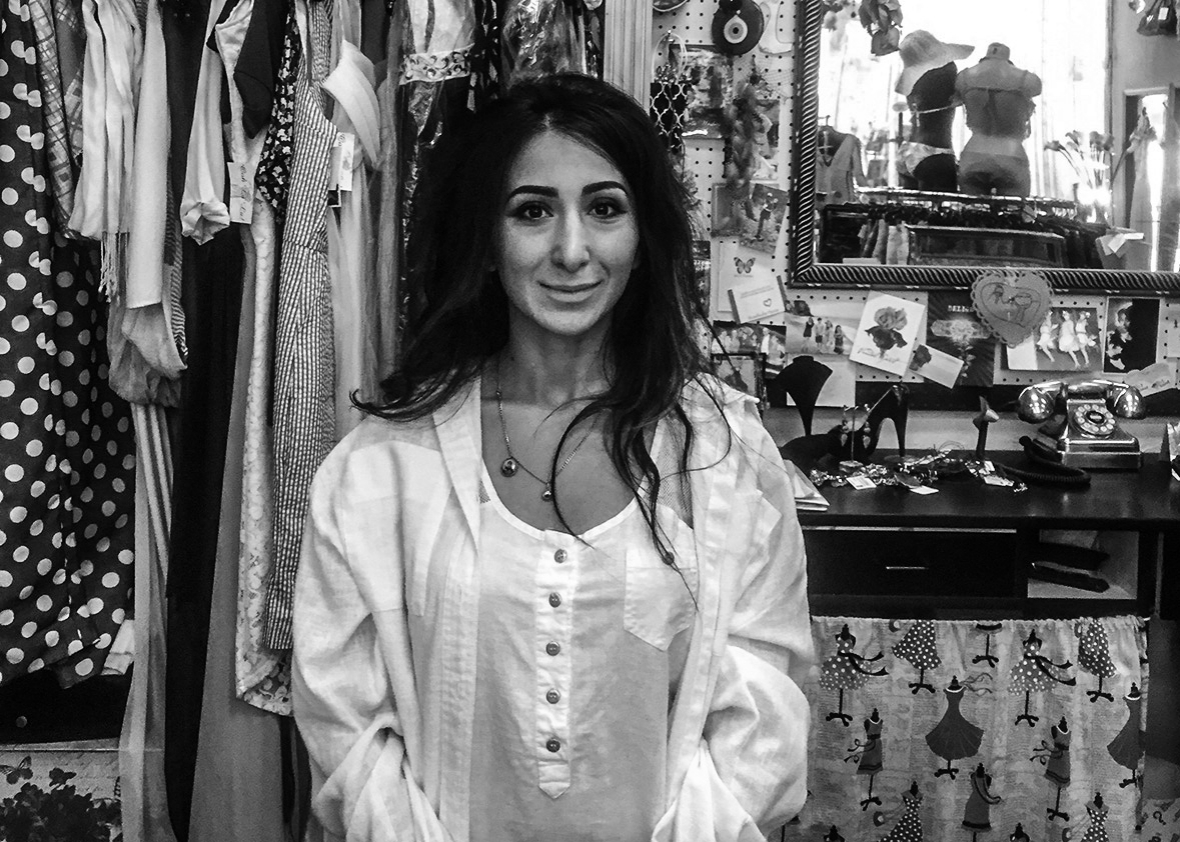
Michelle Goldberg/Slate
“When the story broke out, I knew it was going to be this huge, huge flame,” she told me. “I became scared thinking there’s going to be public justice, violence, protest. This is exactly what they’ve been waiting for. Like, We need them to do one thing. We need one of them to commit a crime.”
With its cheap housing and 3.7 percent unemployment rate, Idaho is one of the five states that absorb the highest number of refugees per capita, with about 1,000 arriving every year. Most of the refugees are settled in the capital, Boise, but about 300 annually are sent to Twin Falls, located in an agricultural region known as the Magic Valley. There, the CSI Refugee Center, a nonprofit run out of the College of Southern Idaho, helps the newcomers restart their lives. Many in town are enormously proud of how their city has welcomed outsiders from around the world. “This is a precious thing in our community,” said Deborah Silver, an accountant and Democratic candidate for state Senate. “We are a haven. Our community is a haven for people who have seen the unimaginable, people who have witnessed things that, thank God, I will never see.”
The first wave of refugees arrived in Twin Falls in the 1980s from Laos, Cambodia, and Vietnam, as well as Eastern Europe. They were followed in the 1990s by people fleeing the war in Bosnia. In recent years, a growing number have come from the Middle East and sub-Saharan Africa as well as Asia. According to data from the CSI Refugee Center, over the past five years, 187 refugees have come to Twin Falls from Iraq, 72 from Afghanistan, 143 from Sudan, and 144 from Eritrea. The largest single group, 233 people, came from Bhutan. “The resettlement program really responds to crises around the world, and so populations change as time goes on,” said Jan Reeves, director of the Idaho Office for Refugees.
At first glance, it might seem like an odd idea to bring traumatized foreigners to a remote, conservative American farming town. Babayan remembers how baffled she was to find herself in Twin Falls as a child. “It was night when we arrived,” she said. “The next morning when we woke up and walked outside of our apartment complex, there was just silence, no walking traffic, no car traffic. I felt like, ‘This can’t be America. Where are we?’ ”
But Zeze Rwasama, the director of the CSI Refugee Center and a Congolese refugee himself, believes smaller towns have advantages for refugees. “The integration process happens faster than in big cities,” he said. “In small towns like this, everyone knows everyone. People are approachable.”
Perhaps more importantly, Idaho’s tight job market and sparse population means there’s a high demand for refugee labor. “To get a job is really easy and fast,” said Rwasama. “And most of those jobs are routine types of jobs; whether you speak English or not, you’ll be able to get them. And the pay is not bad.” Many of the positions, in dairies and food processing plants, pay close to $10 an hour, he said, which goes far in a place where two-bedroom apartments can be had for $500 or $600 a month. The yogurt giant Chobani has its largest plant in Twin Falls, and refugees make up about a third of the workforce.
Refugee advocates insist that the vast majority of Twin Falls citizens support the newcomers. But the spring of 2015 saw an outbreak of anti-refugee rhetoric and activism in town. It began that April, when a story in the local newspaper announced that the city would soon see an influx of Syrian refugees. Immediately, right-wing groups—some from outside of Twin Falls—began organizing to keep them out. In May, activists showed up at the College of Southern Idaho board of trustees meeting: some asking to shut the refugee program down, others demanding local control over which refugees came to town. Hearing about this contretemps, Ron James, a recently retired high school English teacher and supporter of the refugee program, went to the next meeting, which was held in June. There, he was shocked to see a group of men in matching black shirts from the militia group known as III% of Idaho.
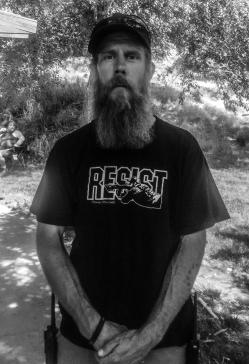
Michelle Goldberg/Slate
One after another, James said, he watched opponents of the refugee center accuse it of engaging in human trafficking and bringing diseases into Twin Falls. “I took it very personally,” he recalled. “Many of the refugees move on to bigger and better things, but at the same time a large number stay here, too, and over 30 years, they’ve become part of our community. I know them. They’re my students—some of my very best students. It’s like, how dare you talk about these people like this? These are our neighbors.”
In the months to come, there was a constant hum of anti-refugee activity in Twin Falls. A group called the Committee to End the CSI Refugee Center made repeated (and repeatedly failed) attempts to put an initiative on the county ballot calling for the termination of the refugee program. In August the American Freedom Party, a California-based white nationalist organization, blanketed Idaho with robocalls urging listeners to voice their outrage over the arrival of Muslim refugees, saying that the “nonwhite invasion of their state and all white areas constitutes white genocide.” In July, local activists brought Shahram Hadian, an Iranian American pastor and ex-Muslim who travels around the country preaching about the dangers of Islam, to speak to two local churches. He returned for another lecture in September.
In October, III% of Idaho organized a demonstration against the refugee program in Twin Falls; the Idaho State Journal reported that nearly 200 protesters, flanked “by gun-toting men in flak jackets,” marched to the College of Southern Idaho. On Nov. 1, the militia organized about 100 people to protest against the refugee program on the steps of the state capitol in Boise. The Southern Poverty Law Center quoted a III% spokesman shouting into a bullhorn: “Now, refugees coming from Islamic hotbeds of terrorism, don’t you think that poses a threat to Idaho communities?” The crowd shouted back, “YEAH!”
* * *
This mounting demonization of refugees in Twin Falls has coincided, of course, with the rise of Donald Trump, who has called for a ban on Muslim immigration and has said that Syrian refugees are “probably” part of ISIS. People in town regularly repeat Trump’s oft-disproven claim that there’s no vetting process in place for refugees from the Middle East. “We can take in some of the refugees, just not all of them,” said Eric Odell, 35, the husband of Davis Odell, founder of the Justice for Our Children Facebook group. “They’re not vetting them, so some of them don’t care about our laws,” he said. “They don’t want to conform to our laws. They want to live Sharia law. And those are the ones we don’t want here, where they believe rape is acceptable, and a woman’s place is underneath their feet.”
The Odells take pains to differentiate themselves from some of their more intolerant neighbors. Eric told me he “can’t stand” ACT for America, describing the group as “pure racists.” Davis used to work at the Chobani factory—she left after a viral illness incapacitated her for months—and knows many refugees who she considers wonderful people. Recently, she said, she and Eric joined Iraqi friends for Ramadan dinner. All the same, they believe that the influx of Muslim refugees into Twin Falls puts them in danger. “Terrorists are already here hiding among them,” Eric said of the town’s refugees. “Eventually something bad is going to happen.” The anxiety in town is so high, according to Davis, that some in Twin Falls were scared to demonstrate in solidarity with the alleged Fawnbrook victim, fearing it would make them targets. “A lot of people are afraid of backlash from the migrant population coming after us for standing up for this one little girl,” Davis said.
Trump speaks to their sense that they are being besieged by outsiders, and to their resentment that they can’t speak up without being called bigots. “Trump is making progress in Idaho because he’s saying what everybody’s thinking,” Davis said. “Is he going about it the right way? He could be a little more tactful, but he’s not a politician. He is somebody who understands. The refugee movement here, yeah, it’s a problem.”
For refugees in Twin Falls, it’s frightening that more people now feel empowered to say that publicly. “What was happening here happened before Trump got hyped up,” Babayan said. But, she added, “when Trump came in, it definitely gave more clout, a legitimacy, to those emotions.” Suddenly, she said, people opposed to refugees thought, “There’s a presidential candidate who sees it like us, and he’s saying the things that we’re feeling. And then you see the videos of the rallies. You’ve got a leader saying, ‘Get those people out.’ That energy spills out into the community, where the community says, ‘Get ’em out!’ ”
Babayan has felt the growing anti-refugee animus in her daily life. People have left her angry voicemails; in one, a woman complained about how much it cost her to have her “throbbing” tooth extracted while her tax dollars paid for refugees’ medical bills. Babayan’s car was keyed; she’s had nasty notes left on her windshield. In June 2015, she says, a woman who had been selling clothes at her boutique abruptly pulled all her merchandise, saying, “I want to do business with Americans.”
Later in the summer, she says, a woman who had overheard her speaking to her son in Russian walked into Ooh La La and said, “If you want to live here, you need to live by the rules here. You need to speak the language of this country.” The woman threatened to deface the store’s front window and told Babayan she would have her deported. (Babayan showed me the notice of trespassing she filed with the police to have the woman banned from the property.) In November, three men marched in to Ooh La La, one of them saying to Babayan’s sales clerk, “We’re just looking to see if you have an American flag displayed in here.”
* * *
Even after it was revealed that the story of knife-wielding Syrians wasn’t true, attention to the alleged attack in Twin Falls kept increasing. On June 22, the right-wing writer Michelle Malkin published a syndicated column titled “Horror and Hush-Up in Twin Falls, Idaho.” “Something wicked happened in Idaho’s rural Magic Valley,” Malkin wrote. “The evil has been compounded by politicians, media and special interest groups doing their damnedest to suppress the story and quell a righteous citizen rebellion.” (Loebs told me that Malkin never contacted him to check any of the facts in her piece; if she had, he would have told her two of the boys were already in custody by the time it was published.) Donald Trump Jr. tweeted out Malkin’s column, asking, “Where’s the outrage for this 5 year old girl???”
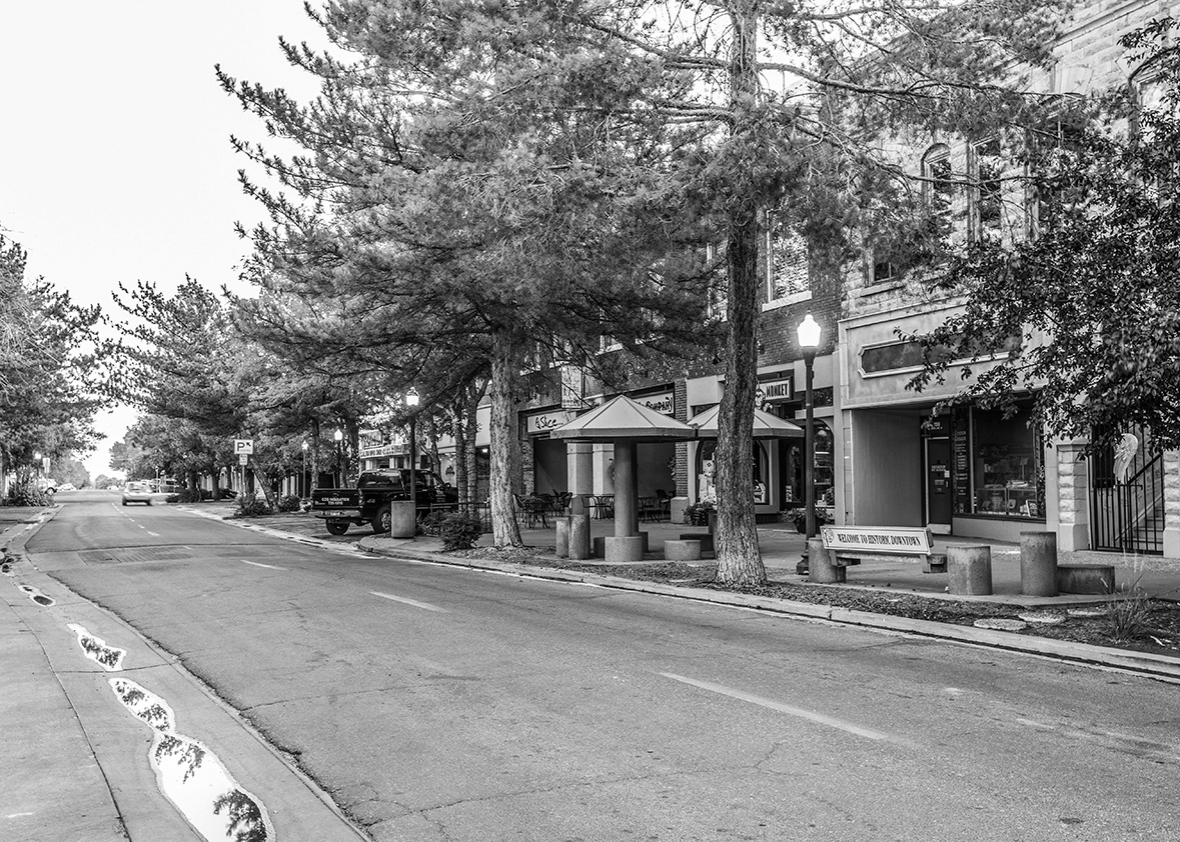
Joy Pruitt/Momo Photography
Two days later, Wendy Olson, United States attorney for the district of Idaho, attempted to ease the febrile speculation about the Twin Falls case only to end up fanning it. Her office issued a statement that read in part, “The spread of false information or inflammatory or threatening statements about the perpetrators or the crime itself reduces public safety and may violate federal law.” This was constitutionally dubious. As Eugene Volokh pointed out in the Washington Post: “There is no First Amendment exception for ‘inflammatory’ statements; and even false statements about matters of public concern, the Supreme Court has repeatedly held, are an inevitable part of free debate.”
Olson’s warning redoubled suspicion on the right that an official cover-up was under way. A Breitbart headline screamed: “Idaho Refugee Rape: Obama Justice Official Threatens Americans Who Criticize Migrant Programs.” Amid the national uproar, Olson issued a follow-up statement to try to clarify her intent: “The statement was not intended to and does not threaten to arrest or prosecute anyone for First Amendment protected speech.” It was too late. The narrative of a politically correct whitewash was further entrenched.
The template for this narrative came from Europe, where in several cases authorities have been accused of hiding information about sexual assaults by Muslim migrants so as not to stoke jingoist reaction. In Cologne, Germany, police investigating mass sexual assaults on New Year’s Eve—many by Muslim men—were reportedly told to keep the word rape out of their initial report. Earlier this year in Sweden, an investigation was launched into charges that police had covered up sexual assaults at a Stockholm music festival. “[S]ome officials said the police force was concerned that assault reports could have boosted the far right,” Reuters reported.
For the anti-refugee right, Twin Falls demonstrated that this pattern had come to America. On July 5, the right-wing site WorldNetDaily ran a story about another reported rash of sexual assaults at a music festival in Sweden. “Activists in Twin Falls, Idaho, have warned that the beginnings of migrant sexual assaults have been unlocked in their community due to the liberal refugee policy supported by President Obama and the GOP-dominated Congress,” it said. WorldNetDaily and other right-wing sites continue to publish frequent updates on the Twin Falls case. Pamela Geller, co-founder of the group Stop Islamization of America, made plans to speak in Twin Falls, only to cancel her event shortly after it was announced due to “security concerns.”
Members of the City Council, as well as the city manager, have been deluged with furious emails. The local Times-News quotes one that police forwarded to the FBI: “Have you any idea how many Americans are hoping and wishing your daughter, wife, mother, sister, aunt, or niece gets gang raped by those (expletive) piece of (expletive) sand (expletive) you’re so (expletive) enamoured with.” According to the Times-News, the Twin Falls’ mayor’s wife, as well as two faculty members at the College of Southern Idaho, received voicemails accusing them of bringing “humanity’s lowest common denominator, essentially human garbage, from Africa and the Middle East, into the Twin Falls area.” The caller referred to Jo Cox, the British MP murdered in June by a man who shouted, “Britain first!”
* * *
For “Lori” (not her real name), the mother of the allegedly victimized 5-year-old girl, the narrative about Muslim predation makes sense of what has happened to her family. A stay-at-home mom who also has a son with autism, Lori told me via text that she has serious physical and psychological difficulties, including autoimmune hepatitis and debilitating anxiety. Over the course of the five days I spent in Twin Falls, she agreed to meet with me several times, but each time either canceled or temporarily stopped responding to messages. At the same time, she occasionally texted me unprompted and suggested I friend her on Facebook. Since June 2, her feed had been full of stories from conservative sites about Muslim violence. Said one of her texts: “In the USA you have to follow our laws and obviously him raping my daughter in their country is OK.” (I have corrected her spelling and punctuation.)
Lori told me that Julie Ruf, the ACT for America activist, is a close friend. She asked me to help publicize a GoFundMe account that Ruf created to raise money so that Lori’s family could leave Fawnbrook. The families of the alleged offenders were served with eviction notices shortly after the older boys were arrested, but while the Eritreans had left, the Iraqi boy and his family had remained. “I have to get out of here I don’t feel safe living here anymore,” Lori texted me.
Fawnbrook is a collection of pale-yellow two-story apartment buildings in the thick of Twin Falls’ centerless sprawl, surrounded by fields but a short walk to both Costco and Target. On the Saturday that I visited, a handful of members of the Liberty Defense Team—a “survivalist-slash-prepping group,” in the words of founder Robert Miller—had come to walk through the grounds in a show of support for Lori’s family. Earlier, 20 or so members of the group had rallied on the Perrine Bridge, which spans the spectacular Snake River Canyon on the edge of town. They held giant American flags and hand-lettered signs: “Where Is America” and “What if It Was Your Daughter: What Then!?” Perhaps surprisingly, Miller disdains the provocative tactics of III% of Idaho, telling me, “They try to make the news, we don’t.” At Fawnbrook, his group was deliberately low-key. There were few residents outside when the Liberty Defense Team arrived, and no confrontations.
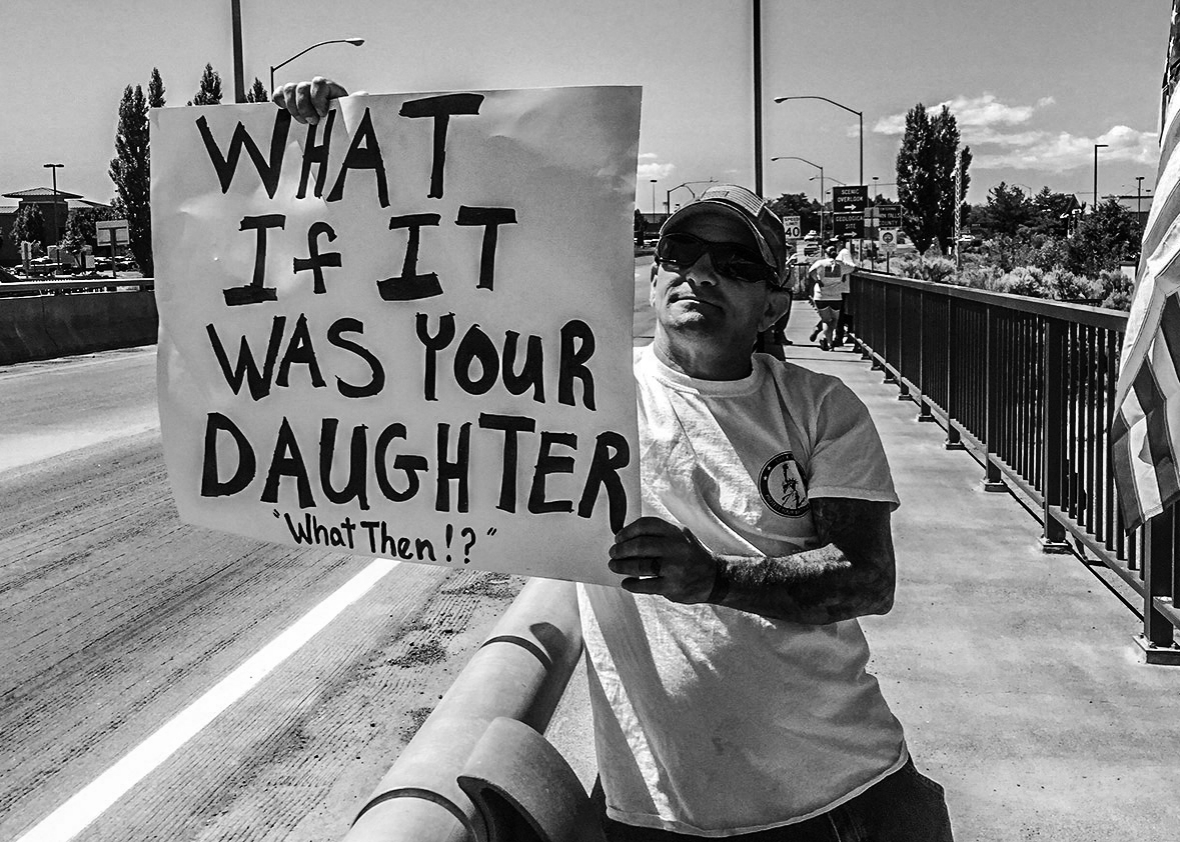
Michelle Goldberg/Slate
Members of the Liberty Defense Team pointed out an apartment where, they believed, the 7-year-old Iraqi boy and his family lived. A woman wearing a black hijab was bustling around the open door. When I said I was going to try to speak to her, one of the Liberty Defense Team men warned me to be careful.
“Salaam alaikum,” I said to her, and she beckoned me inside. Unfortunately, that pretty much exhausted my Arabic, and she didn’t speak English. (I hadn’t been expecting to speak with her and hadn’t brought an interpreter.) She called a little boy over to translate. I don’t know if he was the alleged offender or not; regardless, I wasn’t going to try and question a child about what happened in the laundry room. Instead, I asked where they were from. Baghdad, the woman said. Then I asked whether they were moving. Clinging to his mother’s side, the boy said they were, as soon as the new house is ready.
Imad Eujayl, a Sudanese plant geneticist who serves as spokesman for the local Islamic Center, knows both the Iraqi and the Eritrean families. The Iraqi boy’s mother is a widow, he told me, and has five other children. The Eritrean boys have since been released into their family’s custody, but Eujayl said that the family is struggling since the eviction from Fawnbrook. Without a reference from their previous landlord, they couldn’t rent a new apartment, and with the court case ongoing, they had to stay in town. They were living in another family’s basement. All the boys are being represented by public defenders, but the public defenders’ office won’t release their lawyers’ names. According to Loebs, they technically face a maximum penalty of confinement in juvenile detention until age 21, though he adds that with “minors this young that is almost unheard of.”
Lori texted me the address of the 89-year-old who had discovered her daughter with the boys. She lives directly behind the Iraqi family. I knocked on her door. The woman, who asked that her name not be used, said she’d initially noticed the older boy outside the laundry room, using his phone to take pictures of something inside. At first, she said, she thought he’d never seen a washing machine before, but when she went inside, she found children without their clothes on. “All I saw was little bare bottoms, and the little girl so scared she didn’t know what was going on,” the woman told me. “And she’s still scared.” She said the girl was crying and the room stank of urine. “It was the saddest thing I ever saw,” she said.
The woman said she took the boys outside and made them stay put while she called the police. Initially, according to what Police Chief Craig Kingsbury said at the June 20 City Council meeting, the call that came in was for something “a lot less serious than a sexual assault or lewd and lascivious conduct.” But then Lori discovered what had happened and called the police herself, requesting medical aid. At that point, medical personnel and detectives were dispatched. Lori’s daughter was taken to the hospital and the police seized the boy’s phone, which contained a video of the laundry room encounter.
The case will likely turn on what’s on the video. According to Lori, while they waited for the police to arrive, the boy who recorded it handed his phone over to her fiancé, who watched the recording. Her fiancé, she said, told her it showed oral sex as well as their daughter being urinated on. I asked her if she knew why the boy had been willing to show this recording to his alleged victim’s parent. “Maybe it’s what they do in their country, I don’t know,” she responded. “But I do know that the kids in that country can and are used as sex slaves.”
Loebs, however, told me that the girl’s father only saw a “tiny bit” of the recording. The prosecutor was indignant at all the misrepresentations still swirling around about the case. “I’m a lifelong conservative Republican, and the behavior of the right-wing alternative press on this is atrocious,” he said. “All of this makes this so much more difficult for this child to recover from this.”
* * *
July 11 marked the fourth City Council meeting since the Fawnbrook story broke, and once again the case dominated the proceedings. The first speaker was Lance Earl, a Second Amendment activist and local newspaper columnist, who argued that the federal government has no constitutional authority to settle immigrants in Idaho. “I would like to know why you have not opposed this federal abuse here in Twin Falls,” he said to the council.
Earl was incensed that local police had invited the FBI to investigate threats made against Twin Falls officials, arguing that the involvement of federal law enforcement violates the Constitution. Turning to Kingsbury, seated in the back of the room, he shouted, “What part of the Constitution allows the federal government to be involved in policing activity inside the states?” Why, Earl wanted to know, hadn’t the City Council demanded Kingsbury’s resignation? “If he is going to violate the Constitution of the United States, he is an empty uniform, and he should not be here,” he said.
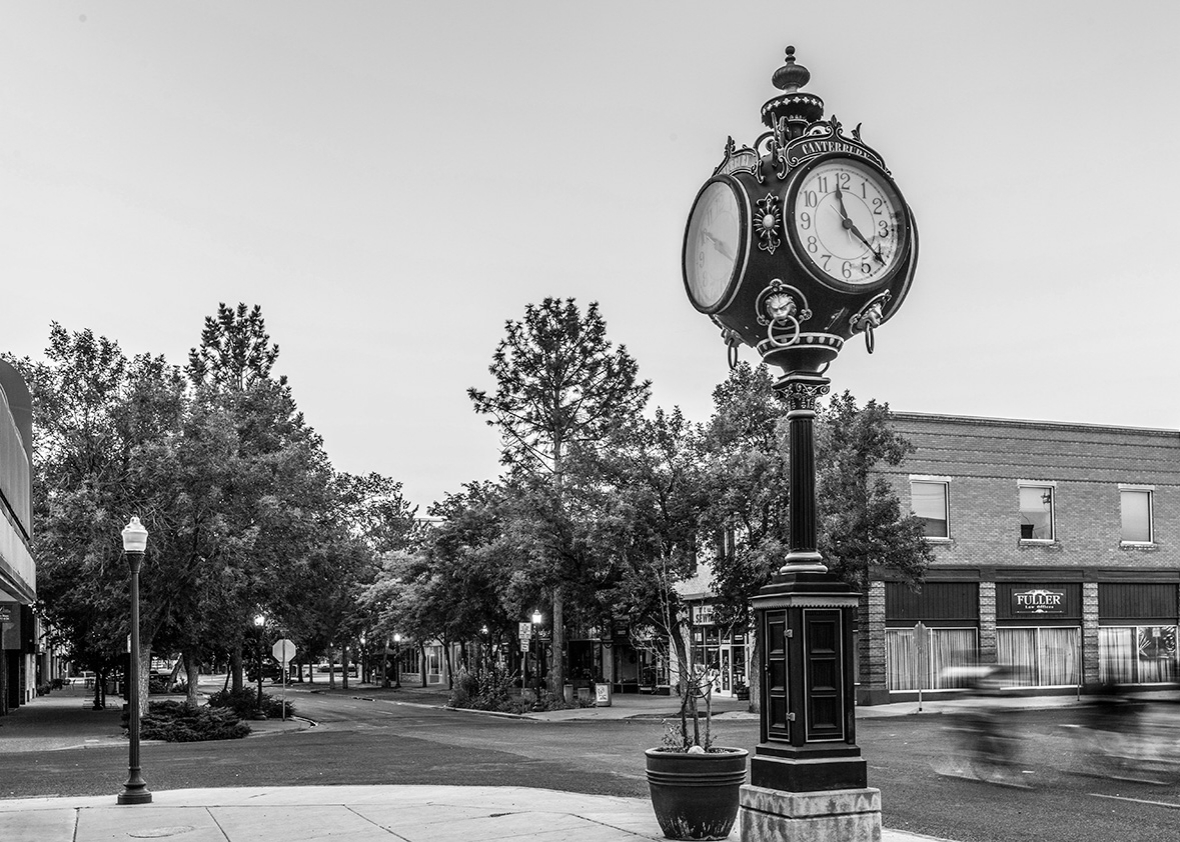
Joy Pruitt/Momo Photography
The City Council tried to impose a five-minute limit on speakers, but when Earl’s time had finished, the next speaker ceded his time so Earl could continue. The city’s lawyer was brought in to consult on whether this was allowed; it was ruled that it was not. Nevertheless, Earl spoke for another minute. “If you people would go back to constitutional principles, the people that would be coming here would be the cream of the crop. They would be coming here to work, and to integrate, and to be American citizens.” The man who’d tried to cede his time then took the microphone and demanded the resignations of every City Council member.
Next up was ACT for America’s Ruf. She said she was bringing Brigitte Gabriel, ACT for America’s founder, to Twin Falls on Aug. 4 and would save front-row seats for everyone on the council. Gabriel is one of the country’s most influential anti-Muslim activists; her group claims 280,000 members. She’s warned that “tens of thousands of Islamic militants now reside in America, operating in sleeper cells, attending our colleges and universities, even infiltrating our government.”
Ruf argued that the council members have a civic duty to hear her speak. “Out of respect to the community, I’m asking you to attend the meetings of the people we bring into this community,” she said. “And that way at least we know that you’re actually trying. You’re trying to understand these bizarre people that come from a totally different position than you do.”
Then Shane Brown, a tall, broad-shouldered bald man with a goatee, stood up. He said he was born and raised in the Magic Valley, and began talking about his guns. “I have a shotgun and a rifle, and I buy shells every couple of years because that’s all I need to get my limit, fill my tag,” he said. Recently, though, outsiders have threatened some of his friends in the community. “And for the first time in my life, I considered and I went and I bought a pistol for protection. There is a group of people that have come into our community, and have infiltrated our community, and have changed it from what I have been born and raised in. These people have brought fear, and anger, and ignorance.”
Brown, who teaches English and theater at the College of Southern Idaho, then condemned the “outside political groups” who have exploited his town’s tragedy. Only at that moment did it become clear that he was talking about the anti-refugee movement, not the refugees themselves.
